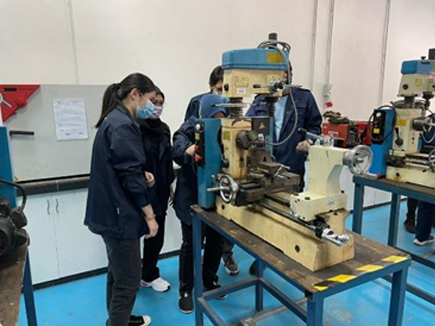Diploma in Materials Engineering
Graduates of the Diploma in Materials Engineering have broad job prospects in both the private and public sectors. Graduates of this program are qualified as assistant engineers or technical personnel in industrial fields such as metal processing and manufacturing, automotive, oil and gas, electronics, material testing, service and maintenance, product control and quality, product design, failure analysis and welding metal. Among the key industry players related to this program are Ann Joo Steel, Antara Steel, Intel, KOMAG, Proton, Perwaja Steel, Perodua and Malaysia Smelting Corporation. While in the public sector, graduates can choose to serve in government departments, statutory bodies and research institutions. In addition to entering the field of employment, graduates also have the opportunity to continue their education to the bachelor's degree level in the field of metallurgical engineering or materials engineering offered by universities at home and abroad.
- Technician / Assistant Process Engineer
- Production Technician / Assistant Engineer
- Quality Control Technician / Assistant Engineering Engineer
- Quality Assurance Technician / Assistant Engineer
- Technician / Assistant Engineer Failure Analysis
- Technician / Assistant Product Development Engineer
- Technician / Assistant Process Development Engineer
- Technician / Assistant Material Development Engineer
- Metallurgist Assistant
- Research Assistant
- Continue their education to the bachelor's degree level
CORE COURSES:
Semester 1
- SDQ10002 Preliminary Mathematics
- KDJ10103 Engineering Science
- KDJ10203 Introduction to Engineering Materials
- KDJ10302 Basic Metal Workshop
- KDJ10403 Engineering Drawing and Computer Aided Drafting
- KDJ10503 Basic Computer Programming
Semester 2
- SDQ10103 Mathematics I
- KDJ10603 Ferrous & Non-Ferrous Metal
- KDJ10703 Basic Static and Dynamic
- KDJ10803 Chemical Thermodynamics
- SDU12302 Skill And Technology In Communication
Semester 3
- SDQ20203 Mathematics II
- KDJ20103 Metal Extractive Technology
- KDJ20203 Technology of Metal Welding
- KDJ20303 Basic Electrical Technology
Semester 4
- SDQ20303 Mathematics III
- KDJ20403 Foundry Technology
- KDJ20503 Metal Testing
- KDJ20603 Strength of Materials
- KDJ20703 Basic Machining of Metals
Semester 5
- KDJ30103 Powder Metallurgy
- KDJ30203 Heat Treatment
- KDJ30303 Metals Protection
- KDJ30403 Occupational Safety and Quality Management
- KDJ30604 Final Year Project
Semester 6
KDJ39908 Industrial Training
- University Requirement Courses (14)
- SDB10102 Communicative English 1
- SDZXXX01 Uniform Body 1
- SDB20102 Communicative English 2
- SDZXXX01 Uniform Body 2
- SDB30102 Communicative English 3
- DUW129/2 Philosophy and Current Issues
- SDB41002 Malay Language
- SDU22402 Engineering Entrepreneurship
FEES & ENTRY REQUIREMENT SECTION
Lorem ipsum dolor sit amet, consectetur adipiscing elit. Ut elit tellus, luctus nec ullamcorper mattis, pulvinar dapibus leo. Lorem ipsum dolor sit amet, consectetur adipiscing elit. Ut elit tellus, luctus nec ullamcorper mattis, pulvinar dapibus leo.
PEO 1
To raise graduates who are competent in their respective engineering fields as exhibited through career development.
PEO 2
To raise graduates who are involved and contribute to society.
PEO 3
To raise graduates who pursue education opportunity continually
PEO 4
To raise graduates who contribute through innovation and entrepreneurship.
PO1 Knowledge
Apply knowledge of applied mathematics, applied science, engineering fundamentals and an engineering specialization to wide practical procedures and practices.
PO2 Problem analysis
Identify and analyze well-defined engineering problems reaching substantiated conclusions using codified methods of analysis specific to their field of activity.
PO3 Design/development of solutions
Design solutions for well-defined technical problems and assist with the design of systems, components or processes to meet specified needs with appropriate consideration for public health and safety, cultural, societal, and environmental considerations.
PO4 Investigation
Conduct investigations of well-defined problems; locate and search relevant codes and catalogs, conduct standard tests and measurements.
PO5 Modern Tool Usage
Apply appropriate techniques, resources, and modern engineering and IT tools to well-defined engineering problems, with an awareness of the limitations.
PO6 The Engineer and Society
Demonstrate knowledge of the societal, health, safety, legal and cultural issues and the consequent responsibilities relevant to engineering technician practice and solutions to well-defined engineering problems.
PO7 Environment and Sustainability
Understand and evaluate the sustainability and impact of engineering technician work in the solution of well-defined engineering problems in societal and environmental contexts.
PO8 Ethics
Understand and commit to professional ethics and responsibilities and norms of technician practice.
PO9 Individual and Team Work
Function effectively as an individual, and as a member in diverse technical teams.
PO10 Communications
Communicate effectively on well-defined engineering activities with the engineering community and with society at large, by being able to comprehend the work of others, document their own work, and give and receive clear instructions.
PO11 Project Management and Finance
Demonstrate knowledge and understanding of engineering management principles and apply these to one’s own work, as a member or leader in a technical team and to manage projects in multidisciplinary environments.
PO12 Life-Long Learning
Recognise the need for, and have the ability to engage in independent updating in the context of specialized technical knowledge.






